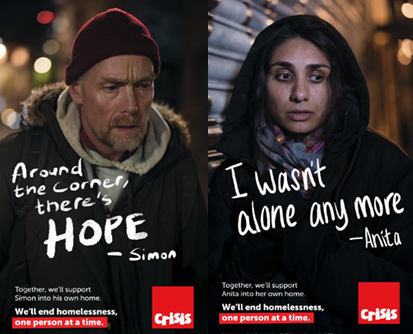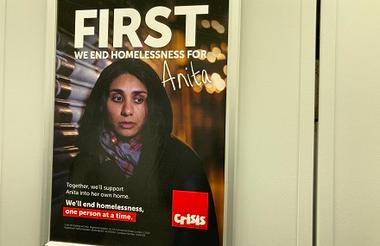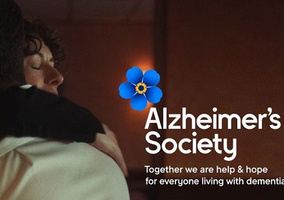Homelessness charity Crisis plans to change some of its Christmas campaign adverts after concerns were raised over how they might be misinterpreted.
The original adverts, which currently appear in places such as London tube stations, feature people named Anita and Simon and read: “First we end homelessness for [Anita/Simon]”.
Some concerns were shared online that the adverts, particularly the one featuring Simon, risked their messaging being seen as mirroring anti-immigrant campaigns for the government to prioritise support for British homeless people over those arriving from other countries.
In a LinkedIn post last month with nearly 300 likes, Amnesty International social media officer Eleshea Williams said the original advert featuring Simon risked “aligning with that famous far-right discourse of ‘helping our own first’.
“A white, British-looking man fits neatly (whether intended or not) into that familiar archetype,” she wrote.
“It’s easy for far-right narratives to co-opt that image to bolster their own agenda, which is a pretty scary thought.
“This is why I think the ad’s language, particularly the big, bold ‘first’, feels politically charged. I think it would have been perfectly fine without.”
Several responses to Williams’ post shared similar concerns over the advert’s messaging, although others disagreed.
Having reflected on the responses, Crisis has now decided to change the adverts’ messaging to quotes from Anita and Simon, reading “I wasn’t alone and more” and “around the corner, there’s hope”, respectively.

‘We have listened to feedback’
Explaining the decision, Crisis’s executive director of brand, marketing and fundraising Andy Taylor-Whyte told Civil Society: “This year, some of the adverts we were running as part of our Christmas campaign provoked debate.
“Our aim was to highlight that Crisis is working to end homelessness one person at a time, as we know for many people the concept of ending homelessness can feel very out of reach, especially when poverty and homelessness is on the increase.
“The campaign featured two different individuals, Anita and Simon. We were made aware that some people had interpreted the adverts as suggesting certain groups in society should be prioritised, over others, for support. This was absolutely not our intention.
“We are proud that our services support anyone experiencing homelessness, no matter their background, and want to ensure this is reflected in the way we present ourselves externally.
“We have listened to people who shared constructive feedback on the campaign and have made some adjustments to our messaging. These changes will be visible in printed adverts in December, and digitally in November.
“We really value feedback and comments on how we talk about ending homelessness and supporting people out of it in the most constructive way.”
Taylor-Whyte added that Crisis would support around 5,500 people over Christmas, including offering advice, healthcare, haircuts and hot food from three hotels in London.
“The generosity of thousands of supporters and dedicated volunteers enables us to deliver our Christmas and year-round services to support people to leave homelessness behind for good,” he said.












